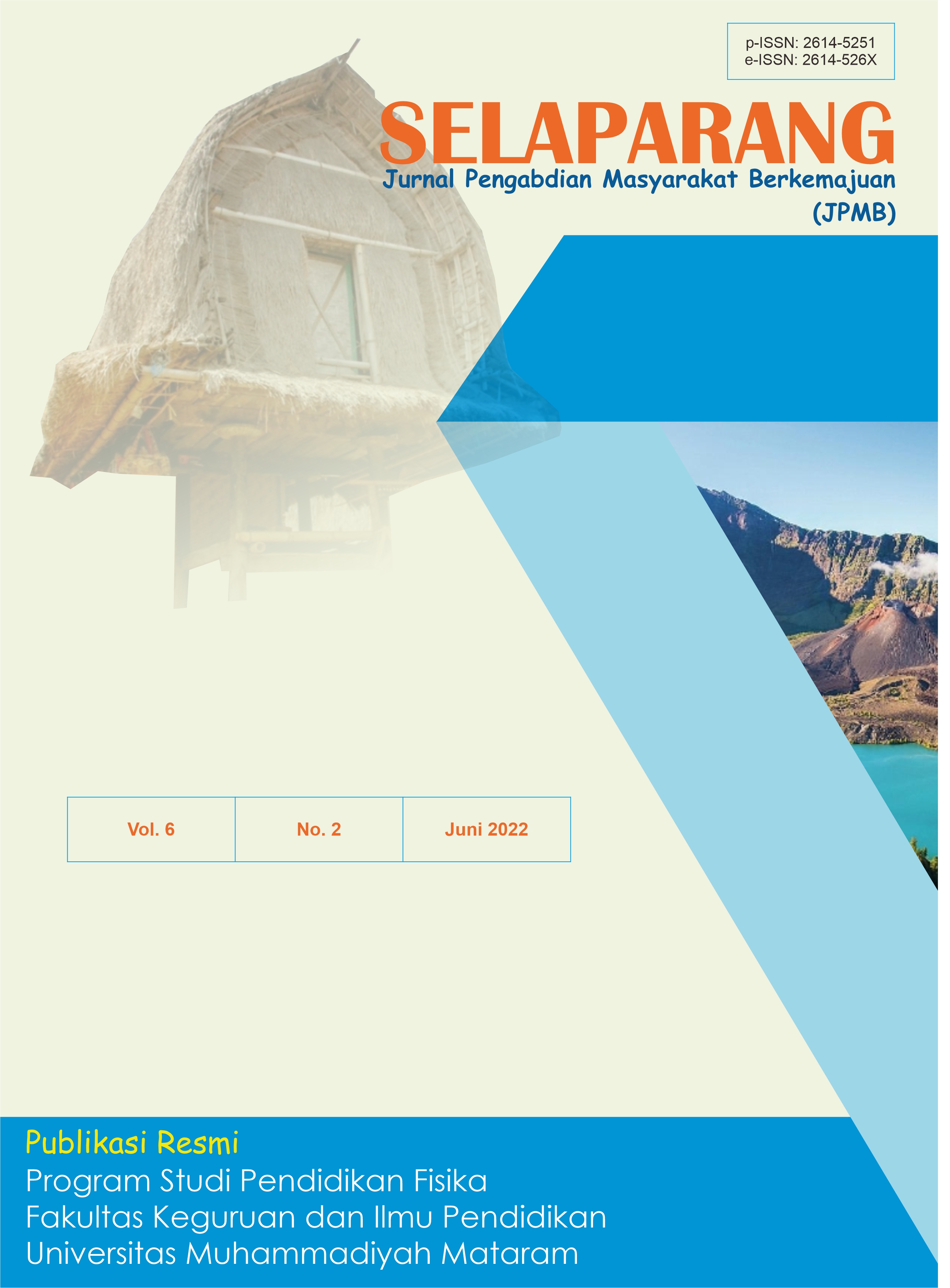PENGABDIAN SAFARI KB IUD DAN IMPLAN
DOI:
https://doi.org/10.31764/jpmb.v6i2.8735Keywords:
young doctor, implants, intrauterine device (IUD), coassistant, family planning safari.Abstract
ABSTRAK
Intra Uterine Device (IUD) dan implan merupakan dua jenis Metode KB jangka panjang (MKJP). Kedua alat kontrasepsi ini membutuhkan ketrampilan dalam melepas dan memasangnya. Â Tri Darma Perguruan Tinggi mencakup bidang pengabdian, juga pendidikan dengan memberikan bimbingan dan pendampingan/supervisi pada dokter muda/koasisten. Tujuan meningkatkan ketrampilan para dokter muda/koasisten dalam melepas dan memasang IUD dan implan, serta meningkatkan cakupan MKJP pada akseptor KB. Metode: Praktek yang dilakukan dalam kegiatan Safari KB bekerjasama dengan BKKBN setempat dalam menjaring calon akseptor. Dokter muda/koasisten melakukan presentasi cara lepas pasang IUD dan implan pada manekin, mendapatkan feedback dari pengabdi sebagai dosen pembimbing, sebagai nilai pretes. Nilai postest didapatkan dokter muda/koasisten dengan melakukan tindakan lepas pasang IUD dan atau implan secara langsung pada akseptor di bawah bimbingan dan pengawasan/supervisi pengabdi 20 orang calon akseptor berhasil dilakukan lepas pasang IUD dan atau implan. Terjadi peningkatan nilai postest 95 dari nilai pretest 75 bagi dokter muda/koasisten. Bagi home base didapatkan peningkatan cakupan MKJP. Bimbingan dan pendampingan dokter muda/koasisten berhasil meningkatkan ketrampilan mereka dan dapat meningkatkan cakupan MKJP pada calon akseptor KB.
Â
Kata kunci: dokter muda; implan; intra uterine device (IUD); koasisten; safari KB.
Â
ABSTRACT
Intra Uterine Device (IUD) and implant are two types of long-term family planning methods (MKJP). Both of these contraceptives require skills in removing and installing them. The Tri Dharma of Higher Education covers the field of service, as well as education by providing guidance and assistance/supervision to young doctors/coassistant. Objectives: to improve the skills of young doctors/coasants in removing and inserting IUDs and implants, as well as increasing MKJP coverage for family planning acceptors. Methods: The practice carried out in the Family Planning Safari activity is in collaboration with the local BKKBN in recruiting prospective acceptors.The young doctor/co-assistant made a presentation on how to remove the IUD and implant it on a mannequin, get feedback from the staff as a supervisor, as a pretest score. The posttest score was obtained by a young doctor/co-assistant by performing the act of removing the IUD and/or implant directly on the acceptor under the guidance and supervision/supervision of a servant. Results: 20 prospective acceptors were successful in removing the IUD and/or implant. There was an increase in the post-test score of 95 from the pre-test score of 75 for young doctors/co-assistants. For the home base, there is an increase in MKJP coverage. Conclusion: Guidance and mentoring of young doctors/coasants has succeeded in improving their skills and can increase MKJP coverage for prospective family planning acceptors.
Â
Keywords: young doctor; implants; intrauterine device (IUD); coassistant; family planning safari.
References
BKKBN. (2015). Rapat Pengendalian Program dan Anggaran Data Bulan Maret 2015. Radalgram (Rapat Pengendalian Program & Anggaran), 1–80.
Brahmana, I. B., Majdawati, A., & Inayati, I. (2022). The Effectiveness of Postpartum IUD Compared to Interval IUD in ‘Aisyiyah Hospital Klaten. Open Access Macedonian Journal of Medical Sciences, 9(T5), 103–108. https://doi.org/10.3889/oamjms.2021.7848
Espey, E., & Hofler, L. (2017). Long-Acting Reversible Contraception : Implants and Intrauterine Devices. The American College of Obstetricians and Gynecologists, 186.
Hartanto. (2016). ANALISIS DATA KEPENDUDUKAN DAN KB HASIL SUSENAS 2015. Rapat Koordinasi Nasional (Rakornas) BKKBN, 1–8.
Hooda, R., Mann, S., Nanda, S., Gupta, A., More, H., & Bhutani, J. (2016). Immediate Postpartum Intrauterine Contraceptive Device Insertions in Caesarean and Vaginal Deliveries: A Comparative Study of Follow-Up Outcomes. International Journal of Reproductive Medicine, 2016, 1–5. https://doi.org/10.1155/2016/7695847
Kepala Badan Dan Kependudukan Berencana Keluarga. (2019). Peraturan Kepala Badan Kependudukan Dan Keluarga Berencana Nasional Nomor 199 Tahun 2016 Tentang Rencana Strategis Badan Kependudukan Dan Keluarga Berencana Nasional Tahun 2015 - 2019. Kepala Badan Dan Kependudukan Berencana Keluarga, 1–54.
Putri, R. P., & Oktaria, D. (2016). Efektivitas Intra Uterine Devices (IUD) Sebagai Alat Kontrasepsi. Majority, 5(4), 138–141.
Rahmi, N., Andriani, M., & Husna, A. (2017). Analisis Faktor yang Berhubungan dengan Minat Akseptor KB Menggunakan Alat Kontrasepsi Dalam Rahim (AKDR) di Desa Keude Panga Kabupaten Aceh Jaya. Journal of Healthcare Technology and Medicine, 3(2), 228–236. https://doi.org/10.33143/jhtm.v3i2.274
Sari, Y. S. N. I., Abidin, U. W., & Ningsih, S. (2019). Faktor - Faktor Yang Berhubungan Dengan Minat Ibu Dalam Pemilihan Alat Kontrasepsi IUD. J-KESMAS: Jurnal Kesehatan Masyarakat, 5(1), 46. https://doi.org/10.35329/jkesmas.v5i1.308
Utami, S. H., Desmiwati2, D., & Endrinaldi, E. (2013). Faktor-faktor yang Berhubungan Dengan Unmet Need KB Pasca-Salin IUD post-placenta di Kamar Rawat Pasca-bersalin RSUP DR. M. Djamil periode Januari-Maret 2013. Jurnal Kesehatan Andalas, 2(3), 158–163. https://doi.org/10.25077/jka.v2i3.158
Downloads
Published
Issue
Section
License
The copyright of the received article shall be assigned to the journal as the publisher of the journal. The intended copyright includes the right to publish the article in various forms (including reprints). The journal maintains the publishing rights to the published articles.

Selaparang : Jurnal Pengabdian Masyarakat Berkemajuan is licensed under a Creative Commons Attribution-ShareAlike 4.0 International License.

